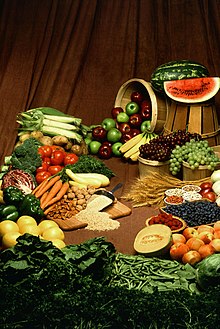Clean eating

Clean eating is a fad diet[1][2] based on the belief that consuming whole foods and avoiding convenience food and other processed foods offers certain health benefits. Variations of the diet may also exclude gluten, grains, and/or dairy products and advocate the consumption of raw food. The diet has been criticized for lacking scientific evidence and potentially posing health risks.[3] Clean eating is not supported by nutritionists, as it may lead to malnutrition and the formation of unhealthy eating practices.[4]
Definition
Clean eating is the belief that consuming whole foods and avoiding convenience food and other processed foods offers certain health benefits.[5][6] Variations of the diet may also exclude gluten, grains, and/or dairy products and advocate the consumption of raw food.[7][8][9]
Proponents
While there is limited research on the health effects of clean eating, clean eating trends have become increasingly popular through the use of various media outlets including blogs, television segments, and magazine articles. Many of these media are supported and headed by various health and wellness gurus who typically base the information they provide on personal experience.[10] Advocates include Ella Mills,[11] Natasha Corrett, and the Hemsley sisters.[12]
Criticism
The idea of clean eating has been criticized as lacking scientific evidence for its claims, and cutting entire food groups out of the diet to pose health risks in extreme cases.[3] It has also been claimed that processed foods have been modified to prevent diseases and therefore have some health benefits (in the form of food safety) over a clean eating diet.[13] It has also been claimed that a clean eating diet may increase the risk of osteoporosis due to a lack of calcium from dairy products.[3] Health risks associated with this diet include food poisoning and diseases from parasites.[14]
See also
References
- ^ Tandoh, Ruby (13 December 2016). "Bad fad – Ruby Tandoh on how clean eating turned toxic". Diets and dieting. The Guardian. ISSN 0261-3077. Retrieved 27 July 2017.
- ^ Wilson, Bee (11 August 2017). "Why we fell for clean eating". The Guardian. ISSN 0261-3077. Retrieved 10 March 2019.
- ^ a b c Byrne, Christine (14 March 2019). "Is 'Clean Eating' Good for You? Not Really". Outside. Retrieved 5 November 2019.
- ^ "Gale - Product Login".[dead link]
- ^ Zeratsky, Katherine. "What is clean eating?". Mayo Clinic. Archived from the original on 3 February 2019. Retrieved 9 February 2021.
- ^ "Definition of clean eating". Dictionary.com. Retrieved 9 February 2021.
- ^ Jackson, Marie (12 April 2017). "'Clean eating': How good is it for you?". BBC News. Retrieved 1 July 2017.
- ^ "Clean eating". BBC Good Food. 24 July 2015. Archived from the original on 5 September 2015. Retrieved 1 July 2017.
- ^ Voo, Jocelyn (26 November 2013). "The Complete Crash Course on Clean Eating". Fitness. Retrieved 20 August 2022 – via Yahoo! Life.
- ^ Fivian, E.; Wood, C. (25 June 2019). "The Roles of Social Media, Clean Eating and Self-Esteem in the risk of Disordered Eating: A Pilot Study of Self-reported Healthy Eaters". International Journal of Food, Nutrition and Public Health. 10: 28–39. doi:10.47556/J.IJFNPH.10.1.2018.3.
- ^ "Clean Eating: The Dirty Truth: Is Clean Eating the Best Approach to Better Health?". CBC.ca. Archived from the original on 28 June 2017. Retrieved 1 July 2017.
- ^ Niven, Lisa (17 January 2017). "What is Clean Eating, Anyway?". British Vogue. Retrieved 1 July 2017.
- ^ Fjellström, Christina Maria (2003). "Natural Foods". In Katz, Solomon H (ed.). Encyclopedia of Food and Culture. New York: Scribner. pp. 551–553. ISBN 9780684314167.
- ^ "Whole Foods Vs. Processed Foods". The Gale Encyclopedia of Alternative Medicine (Fifth ed.). Farmington Hills, MI: Gale Research Inc. 13 December 2019. ISBN 9781410394279.
External links
 Media related to Clean eating at Wikimedia Commons
Media related to Clean eating at Wikimedia Commons
